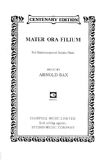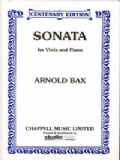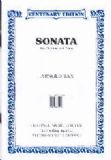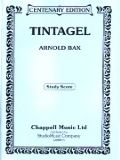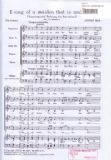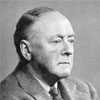
Arnold Bax
Arnold Edward Trevor Bax was born in Streatham, South London, on 8 November 1883, though during the most impressionable years of his youth the family lived at Ivy Bank, a mansion which stood in extensive grounds at the top of Haverstock Hill in Hampstead. His parents were of independent means, and Bax never had to earn a living - a fact that strongly influenced his musical development. Arnold had two brothers and a sister. One of the brothers died in childhood, but the other, Clifford was a well known playwright and writer, while his sister Evelyn, now in her nineties, has lived to see her brother's centenary year.
When he was nearly 17 years old he entered the Royal Academy of Music in London, where he remained for five years. His teachers were Frederick Corder for composition, and Tobias Matthay for piano. Corder's passion for Liszt and his mastery of the orchestra may well have influenced his pupil, but Bax's powerful pianism appears to have owed little to Matthay's tenets of piano playing. Bax's contemporaries at the Academy were, in their day all brilliant - York Bowen, Benjamin Dale and Paul Corder (Frederick's son) are particularly noted, though largely forgotten now.
While he was at the Academy Bax discovered the poetry of W. S. Yeats, and as a result visited Ireland. "I spent most of my time in the west, always seeking out the most remote places" Bax later remembered, adding "I do not think I saw the men and women passing me on the roads as real figures of flesh and blood; I looked through them back to their archetypes, and even Dublin itself seemed peopled by gods and heroic shapes from the dim past". His love of Ireland stayed with him for the rest of his life, and for many years Irish programmes and images were reflected in his music, while he also wrote poetry, short stories and plays using the pseudonym of "Dermot O'Byrne".
When he was still at the Academy Bax's student works included an orchestral tone poem Cathaleen-ni-Hoolihan (1903-5), A Concert Piece for viola and piano (1904) (written for Lionel Tertis), and many songs of which A Celtic Song Cycle (1904), five songs to words by Fiona Macleod were published. At this time Bax's best work appeared in his songs, and one written in 1906, The White Peace (words also by Fiona Macleod), became one of his best-known works, and was recorded by John McCormack.
Musically Bax swayed between the influences of Irish folksong and those of Germany and, later, of Russia. A number of orchestral works grew out of an abortive attempt to write an opera on the Dierdre legend, and of these the atmospheric In the Faery Hills (1909) is the earliest of his orchestral works to have been published, while Roscatha (1908-10), a vivid orchestral battle song is clothed in the colour and harmony of Rimsky-Korsakov, though without Bax's identity ever being in doubt.
In 1910 Bax visited Russia, going to Moscow, St Petersburg and the Ukraine, and afterwards some works appeared which seem to show an influence of Russian music, an influence strongly reinforced by the repertoire of the Russian Ballet between 1911 and 1914, and again after the First War. Before, during, and just after the War Bax wrote a host of short piano pieces as well as two piano sonatas (there were two more later) and two violin sonatas (a third appeared later); there were also a large number of songs, and the shorter works in particular began to appear in print, thus finally establishing his reputation with a large audience.
However, his reputation really rests on his orchestral works, and although he wrote many of his best scores during the period 1912 to 1918, it was only after the War that they were heard and the full range of his orchestral palette appreciated. They range in scale from the exuberance of The Happy Forest (1914, orch 1921) and the delightfully evocative Summer Music (1917, orch 1921, rev 1932) to the elaboration of the Debussian Celtic tone poem The Garden of Fand (1913, orch 1916) and the grimmer landscape of November Woods (1917) with its autobiographical overtones of Bax's indecision over his love affair with the pianist Harriet Cohen and his loyalty to his wife. Other works from this period include Nympholept (1912, orch 1915) and Spring Fire (1913), both deserving wide
performance.
Bax did leave his wife - in March 1918 - and afterwards his name was associated with that of Harriet Cohen who performed many of his works. For her was written the massive Symphonic Variations (1916-18) for piano and orchestra which she first played at Queen's Hall in 1920.
The Great War undoubtedly had an effect on Bax and his art - few could have lived through it without it leaving its mark -but Bax did not serve in the armed forces, and the event that tore his soul was undoubtedly the Easter Rising in Dublin in 1916. His personal acquaintance with many of the protagonists of that "burningly idealist adventure", his revulsion at the British reaction and his divided loyalties as well as his horror at the Irish civil war, was undoubtedly expressed in music written at the time, though by the time he came to write the powerful First Symphony (1921-2) with its tragic and elegiac slow movement his emotional reaction to human conflict was being expressed in archetypal rather than specifically personal terms.
Once launched as a symphonist Bax went on to write six more symphonies. The Second Symphony (1924-6) continues the mood expressed in the first, though now its underlying emotional thread was personal. "I was going through hell at the time" Bax remarked, and his tormented mood had to do wth his deteriorating relationship with Harriet Cohen. Later, the Third Symphony (1928-9) arrived not only at an emotional stabilisation but also signalled a conscious attempt to expand his musical language, beginning to take note of the presence of Sibelius on the musical scene of the late 1920s. It was to Sibelius that he dedicated his next work, the Winter Legends for piano and orchestra (1929-30), which together with the Fourth Symphony (1930-1) celebrated in music a new optimism in his outlook. It was at about this time that he became romantically attached to Mary Gleaves who was to remain his companion for the rest of his life, and it is persuasive to read his euphoric mood at the time in his music.
During the 1930s he started receiving honours — honorary degrees, his knighthood in 1937, and in 1942 he was made Master of the King's Music. He did not seek these, indeed he had to be persuaded into accepting, but as he became more and more celebrated, outwardly at least an establishment figure, so his will to compose gradually left him. His Fifth and Sixth Symphonies (1931-2 and 1934) revert to the emotional landscapes of the first three, while in their musical language the influence of Sibelius becomes noticeable in superficial orchestral parallels, and Tapiola is quoted in the Sixth. The Seventh and last symphony (1938-9) is a more relaxed and extrovert score and closes the door he had opened on his unique personal vision some thirty years before. He continued to write, though on a reduced scale, and few of the last works approach the power of his earlier music. Perhaps the Wartime tone poem A Legend (1944) deserves more than an occasional hearing and his late Piano Trio (1945) reminds that in chamber music too he was a master, the three string quartets (1918, 1925, 1936), the massive piano quintet (1914-5) and delightful oboe and harp quintets (1922, 1919) being but a selection of a large corpus of worthwhile music.
At the end of his life Bax travelled widely around Ireland, visiting all the places which he had known intimately in his youth, almost as if he was saying goodbye. He died at the home of Professor Aloys Fleischmann, in Cork on 3 October 1953 just short of his seventieth birthday.
Reproduction Rights
This biography can be reproduced free of charge in concert programmes with the following credit: Reprinted by kind permission of Warner/Chappell
Bestselling Titles by Arnold Bax
-
Publisher: ChappellUsually despatched within 7-10 working days - Lead times may vary in the case of supplier shortages or delays$3.80
-
Publisher: ChappellSpecial Order: Usually despatched within 20-30 working days - Lead times may vary in the case of supplier shortages or delays$5.40
-
Publisher: Studio MusicSpecial Order: Usually despatched within 10-15 working days - Lead times may vary in the case of supplier shortages or delays$20.31
-
Publisher: ChappellSpecial Order: Usually despatched within 10-15 working days - Lead times may vary in the case of supplier shortages or delays$17.72
-
Publisher: Studio MusicSpecial Order: Usually despatched within 10-15 working days - Lead times may vary in the case of supplier shortages or delays$23.81
-



